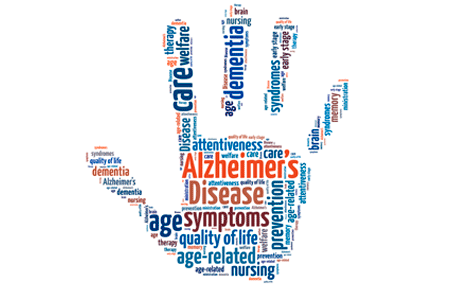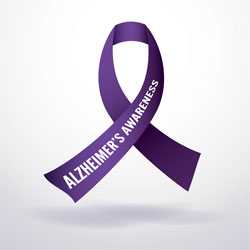September is World Alzheimer's Month
 Learn more about Alzheimer’s disease.
Learn more about Alzheimer’s disease.
When is memory loss more than forgetfulness?
Although everyone’s brain changes as they age, it’s important to understand that Alzheimer’s disease is not a normal part of aging. Memory loss is typically one of the first warning signs of Alzheimer’s disease, but occasionally forgetting words or names does not mean a person has Alzheimer’s. There are other signs that someone in the early stages of Alzheimer’s disease may experience in addition to memory problems. In the early stages of the disease, these can include:
- Getting lost in familiar places.
- Having trouble handling money and paying bills.
- Repeating questions.
- Taking longer to complete normal daily tasks.
- Displaying poor judgment.
- Losing things or misplacing them in odd places.
- Displaying mood and personality changes.

Alzheimer’s disease affects more than the person; it impacts the family.

Memory loss is typically one of the first warning signs of Alzheimer’s disease, learn the signs and symptoms associated with the disease; they shouldn’t be ignored.
There are other causes for memory loss, such as depression and some medications, or interactions between medications. These are treatable conditions and the symptoms can be reversed. However, these are serious medical issues and should be identified and treated by a health care provider as soon as possible. There is currently no single test or measure that can tell you if you have Alzheimer’s disease.
If you or someone you know has several or even most of the signs listed above, it does not mean that you or they have Alzheimer’s disease. It is important to consult a health care provider to rule out treatable causes when you or someone you know has concerns about memory loss, thinking skills, or behavioral changes. Although getting Alzheimer’s disease cannot yet be stopped or reversed, an early diagnosis allows people and their families:
- More time to plan for the future.
- Less worry about the unknown.
- Increased opportunities to participate in clinical drug trials to help advance research.
- More time to make decisions about care, living options, and financial and legal affairs.
- More time to develop relationships with doctors and care partners.
The bottom line is that signs and symptoms associated with Alzheimer’s disease shouldn’t be ignored. However, it’s not always the case that having some of these symptoms is a certain sign that you have the disease. Instead, until better diagnostic tests are designed, it’s better to be cautious and discuss your concerns with your health care provider.
Learn more about Alzheimer’s Disease – the facts, the signs, treatment, and how loved ones can support friends and family members living with the disease.
- Page last reviewed: September 29, 2016
- Page last updated: September 29, 2016
- Content source:
- National Center for Chronic Disease Prevention and Health Promotion, Division of Population Health
- Page maintained by: Office of the Associate Director for Communication, Digital Media Branch, Division of Public Affairs




 ShareCompartir
ShareCompartir